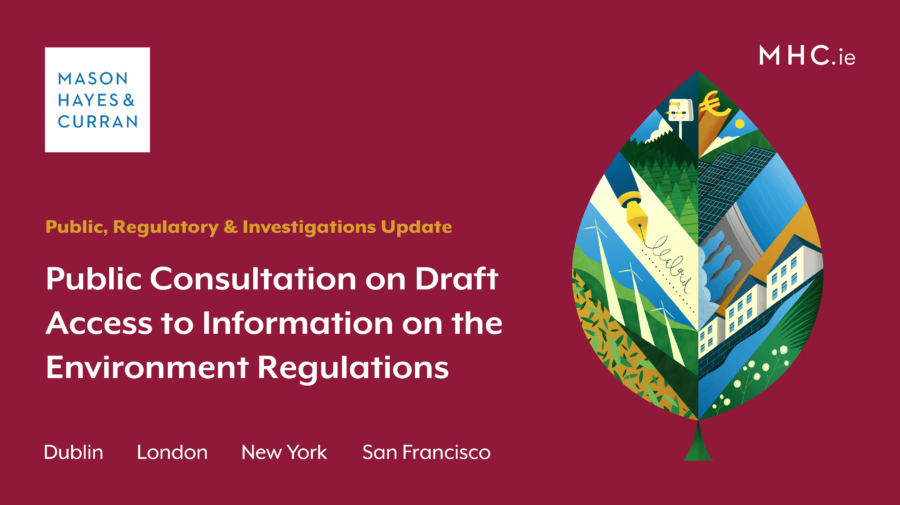Public Consultation on Draft Access to Information on the Environment Regulations
Scope of the proposed amendments

The Department of the Environment, Climate and Communications recently published proposed amendments to the AIE Regulations. The Department also opened a short public consultation on the proposals, which closed on 8 January 2024. Lisa Joyce, partner in our Public, Regulatory & Investigations team, examines some of the proposed amendments.
The Access to Information on the Environment Regulations 2007 – 2018 (AIE Regulations) are a key piece of environmental legislation. The Regulations implement the first pillar of the Aarhus Convention and transpose the EU Access to Information on the Environment Directive into Irish Law.
The AIE Regulations have been under review by the Department of the Environment, Climate and Communications (DECC) since March 2021. However, on 14 November 2023, DECC published new Draft AIE Regulations 2023 for public consultation with the aim of gathering stakeholder feedback. The closing date for submissions was on 8 January 2024.
We examine some of the key proposed changes in the Draft Regulations and consider how they may impact public authorities that are subject to the AIE legislation.
The Draft Regulations propose to re-structure and re-number some of the existing provisions, which would take some getting used to. In addition, some of the substantive changes proposed are as follows:
New duties of public authorities
Public authorities have specific statutory duties under the current AIE Regulations to proactively publish and disseminate information and to maintain it in a manner that is up-to-date and easily accessible. Public authorities are also obliged to inform the public of their rights under the AIE Regulations. The Draft Regulations propose to expand these statutory duties, to include a proactive duty to inform the public where the following specific environmental information may be requested and where they may be located for review:
- Authorisations that have a significant impact on the environment
- Environmental agreements, and
- Environmental impact studies and risk assessments concerning elements of the environment
In addition, the Draft Regulations propose to require public authorities to organise the environmental information that they hold with a view to its active and systemic dissemination to the public by information technology or other electronic means. This would require public authorities to carefully consider and potentially completely overhaul how they process, store, tag and publish this information.
Requirements for making a valid request
Under the current AIE Regulations, in order for an AIE request to be valid, it must state any relevant contact details of the requester. The Draft Regulations propose that this requirement can be met by providing an email address.
In addition, where an AIE request is invalid because it is too general and the public authority is considering refusing it on this basis, it must first offer the requester a chance to resolve this invalidity, by making a more specific request. The Draft Regulations propose that:
- A more specific request subsequently made would be treated as having been received on the later date – eg the date of the more specific request, and
- The original AIE request would be considered withdrawn
Formal third-party consultation procedure
Currently, where a public authority is considering the release of environmental information that was voluntarily provided by a third party, and which could adversely affect that third party, the public authority must make all reasonable efforts to contact the third party concerned and seek their consent or otherwise to release the information. The Draft Regulations propose to expand and formalise this consultation procedure. This proposal would make it much more like the formal third-party consultation procedure under Section 38 of the Freedom of Information Act 2014. For example, the obligation to consult affected third parties would apply to environmental information covered by three of the refusal grounds – where release could adversely affect:
- Personal information
- Voluntarily provided third-party information, or
- Commercial or industrial confidentiality
The public authority would also be expressly required to notify third parties of its intended decision and appeal rights and invite the third parties to consent or provide submissions setting out why releasing the information concerned would adversely affect their interests.
Grounds of refusal
Finally, the Draft Regulations make numerous changes to the grounds for refusal of access to environmental information. For example, it is proposed to combine all of the grounds together in one section, and that all grounds would be discretionary. It is also proposed that public authorities would have a broader entitlement to refuse manifestly unreasonable requests, as this ground would no longer be limited by reference to the volume or range of information sought.
Conclusion
Awareness and use of the right of access under the AIE Regulations is at an all-time high. The number of requests made are increasing steeply year-on-year, reflecting heightened concern about the climate crisis and Ireland’s response to it. The burden on public authorities to comply with all of their obligations under the AIE Regulations is also therefore increasing correspondingly. On this basis, it is important that all organisations who use or are subject to AIE understand how they are impacted by the proposed amendments in the Draft AIE Regulations 2023.
The public consultation on the Draft Regulations closed on 8 January 2024 and DECC has said that it will consider all feedback and submissions before publishing the final version of the amended AIE Regulations.
For more information on the implications of the proposed amendments, contact a member of our Public, Regulatory & Investigations team.
People also ask
What are the Access to Information on the Environment Regulations? |
The AIE Regulations provide for a legal right of access to information on the environment. Under these Regulations, environmental information held by, or for, a public authority must be made available on request, subject to certain exceptions. The AIE Regulations also oblige public authorities to be proactive in disseminating environmental information. |
What is the difference between an Access to Information on the Environment request and a Freedom of Information request? |
The AIE Regulations operate in parallel with the Freedom of Information Act 2014. While the two legislative codes are broadly similar access regimes, regarding environmental information, the AIE Regulations only apply to “environmental information”, whereas the FOI Act can apply to any type of information or records. There are also material differences in the grounds under which access to information can be refused under the two legislative codes. |
How do I make a request for Access to Information on the Environment? |
You should make a written request to the relevant public authority clearly stating the environmental information you want and providing your name and contact details. You should state your request is made under the AIE Regulations and be as specific as possible about the information sought and the preferred method of access. |
The content of this article is provided for information purposes only and does not constitute legal or other advice.
Share this:



